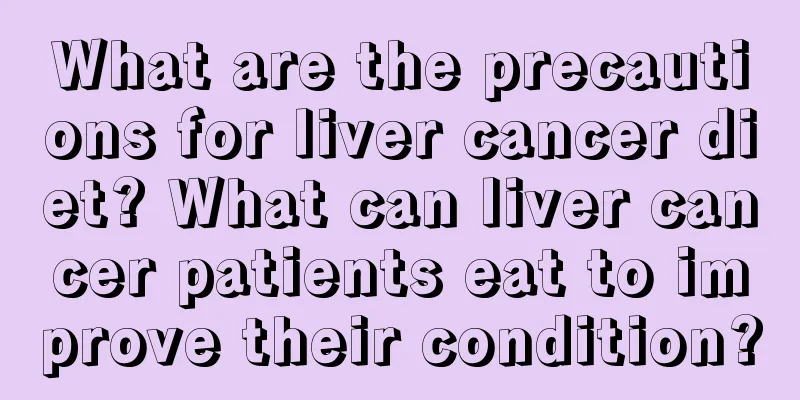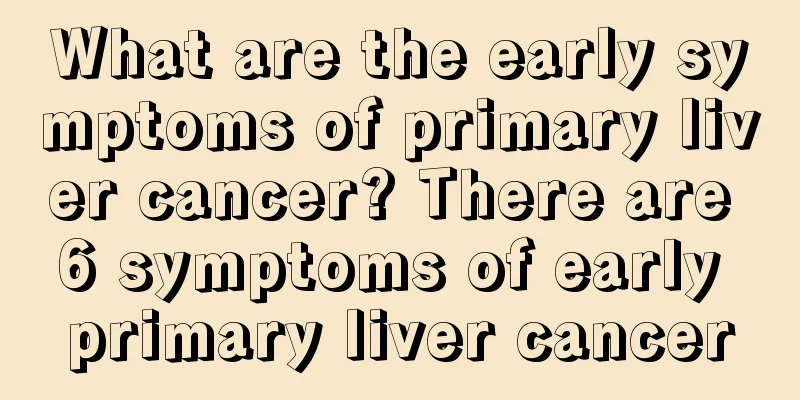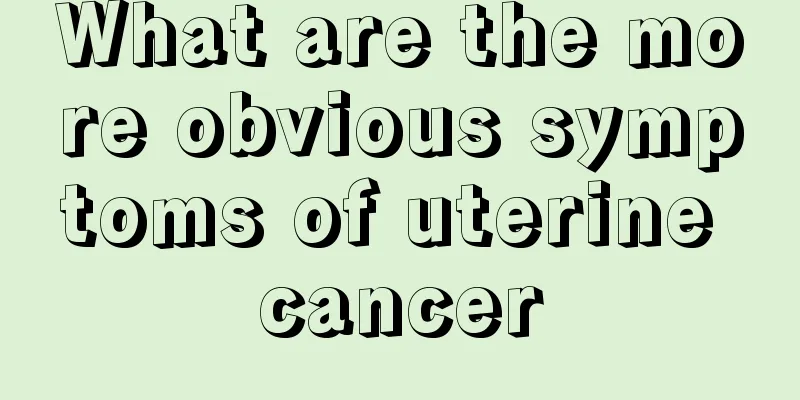What are the precautions for liver cancer diet? What can liver cancer patients eat to improve their condition?

|
Liver cancer is highly malignant and progresses rapidly. Patients usually do not feel any discomfort in the early stages. Once symptoms appear, they are usually in the middle or late stages. Therefore, the treatment is difficult and the efficacy is poor. Generally, the survival time after onset is only 6 months. It is known as the "king of cancers." Some people with liver cancer often ask, why do I get liver cancer when other people are healthy? Are you a liver cancer patient? 1. People with a family history of liver cancer On the one hand, many inherited diseases that damage the liver, such as pigmentation disease and glycogen storage disease, will develop into cirrhosis, and the incidence of liver cancer is also very high; on the other hand, it is believed that the familial clustering of liver cancer is mainly caused by the clustering of hepatitis B virus. There is currently no evidence that liver cancer can be inherited. 2. Patients with post-hepatitis cirrhosis More than 50% of patients with cirrhosis develop cancer, and most of them have recurrent symptoms, poor liver function improvement, and frequent complications such as ascites. 3. People living in areas with a high incidence of liver cancer The high incidence areas of liver cancer in China are mainly in the southeastern coastal areas, such as Fusui and Longan in Guangxi, Xiamen and Tongan in Fujian, Qidong and Haimen in Jiangsu, Chongming and Nanhui in Shanghai, etc. In these areas, at least 30 people die of liver cancer per 100,000 people. In addition, the incidence of liver cancer is higher in coastal areas than in inland areas, and higher in southeastern and northeastern regions than in southwest and northwest regions. 4. Long-term alcoholism Long-term alcohol abuse can significantly damage liver cells and lead to malnutrition, making the liver prone to cirrhosis, which can develop into liver cancer. Of course, in addition to the above dietary factors, hepatitis B, parasitic diseases in the liver (such as Clonorchis sinensis), and genetic susceptibility are also closely related to the occurrence of liver cancer. It should be pointed out here that when the above two factors come into play, liver cancer is more likely to occur, such as hepatitis B and aflatoxin exposure, which will cause the disease faster. Alcohol poisoning can also cause alcoholic fatty liver, alcoholic hepatitis, and alcoholic cirrhosis. In alcoholic hepatitis or cirrhosis, the number of Kupffer cells decreases, which can increase the occurrence of liver cell cancer. 5. Gene mutation Mutagens and viruses in the environment stimulate the activation of liver cell division response pathways, causing point mutations and gene translocations in cells, which are possible factors that accelerate the proliferation of cancer cells. 6. Drinking water is unhealthy Water is an important substance for maintaining the normal survival of human organisms. Water itself certainly does not cause tumors, but epidemiological surveys have shown that the degree of drinking water pollution is positively correlated with the incidence of liver cancer. This undoubtedly indicates that there are carcinogens in the water source, and it may be the combined effect of multiple carcinogens, such as humic acid, blue-green algae toxins, etc. How to prevent liver cancer through diet 1. Do not pollute drinking water. Drinking water with chemicals can easily cause cancer. Tap water is not necessarily clean. There are water tanks on the roofs of buildings with more than 5 floors. The water tanks should be cleaned by a dedicated person. It is best to perform secondary disinfection. The water tank body should also use chemicals that will not pollute water. 2. Appropriate selenium supplementation. For people with low selenium levels, selenium-enriched yeast, selenium polysaccharides, and selenium-enriched salts can be used to supplement selenium and increase blood selenium levels. 3. Reduce the intake of nitrosamines and quit smoking and drinking. Smoking and drinking are also bad for fatty liver. Drinking wine, beer, and a small amount of alcohol can promote blood circulation and remove blood stasis. In fact, this is not true. Alcohol is harmful to the human body. The gastric mucosa in the stomach has a protective effect on the human body. Alcohol can digest the gastric mucosa, injure the cells of the stomach, and the toxic substances in the food are easily absorbed by the stomach. This can easily cause alcoholic hepatitis, reduce the immune function of the liver and the whole body, and damage the detoxification function of the liver. This is why people who drink have poor detoxification function and are prone to alcoholic cirrhosis, and some cirrhosis will turn into liver cancer. 4. Prevent hepatitis. Using hepatitis vaccines to prevent hepatitis and thus liver cancer has become one of the most promising ways to prevent liver cancer. Not only should children be vaccinated with hepatitis B vaccine when they are born, but adults who have not been vaccinated with hepatitis B vaccine and have not had hepatitis can also be vaccinated with hepatitis B vaccine. However, it is estimated that it will take decades to see the effect. In addition to the hepatitis B vaccine, attention should also be paid to the control of other transmission routes, such as diet, surgery, blood transfusion, injection, acupuncture and hairdressing. Recommended: What to eat for liver cancer patients 1. Low-salt diet Some patients do not pay too much attention to details in their daily diet, and still follow the high-salt diet before the disease. Experts tell everyone that this is an incorrect eating habit. How should patients with advanced liver cancer eat? Patients with liver cancer, especially those in the advanced stage, should adhere to a low-salt diet. Patients with ascites should pay special attention to diet, control sodium intake, and eat a low-salt diet. 2. Liver-protecting and blood-replenishing foods Because the onset of this disease is related to the liver, it is natural to eat more foods that can nourish and protect the liver to prevent liver function from declining. Foods that have the effect of nourishing and protecting the liver include mushrooms, oysters, and shiitake mushrooms. It is not enough to protect and nourish the liver, so what should be the diet for patients with advanced liver cancer? Because the patient is weak after the operation, he should eat some foods that can stop bleeding and replenish blood to replenish qi and blood. 3. Eat small, frequent meals Patients who develop to the late stage generally have some impact on their liver function, so it takes time for the body to recover. The fat absorbed by the intestine and digestion will also be affected by liver metabolism. What should patients with advanced liver cancer eat? Therefore, patients should have a reasonable diet, with easy to absorb and digest, as diverse as possible, and the diet should be light, rich in high fat and vitamins and low in fat, and adhere to the principle of eating small meals frequently. |
<<: How to prevent liver cancer? This is the best way to effectively prevent lung cancer
>>: Will liver cancer be contagious? The simplest way to prevent liver cancer is revealed
Recommend
What will happen if polycystic ovary syndrome is not treated
Polycystic kidney disease is a benign kidney dise...
It is the most unhygienic to use toilet paper at this time
Most toilet paper is recycled paper, and the raw ...
What kind of body type does a fat upper body belong to
Being fat is a problem that many people have, and...
What is the best medicine for high cholesterol? Can it be cured by taking medicine?
High cholesterol can be treated with drugs. Depen...
What a waste! You don’t know 90% of the uses of cooling oil
1. If bamboo furniture has termites, just inject ...
What is the use of disposable masks
Disposable masks have very good ventilation perfo...
Be alert to the symptoms of mild developmental delay!
For mild developmental delay, the symptoms are no...
What are the effects of furnace-dried stone detergent
The effect of furnace-dried stone lotion in treat...
How to better treat long-term lack of sleep?
Nowadays, people are prone to lack of sleep due t...
Is rectal cancer serious? Please see the doctor's introduction!
Rectal cancer is a serious disease. It is serious...
Red and hot face_Red and hot face
There are many reasons for redness and hotness of...
How to make vegetarian cucumber steak
Cucumber is a very nutritious and delicious green...
Characteristics of TCM treatment of skin cancer
Skin cancer is a malignant tumor with a low incid...
Should I use hot or cold water to cook kelp?
Kelp is something that grows in the sea. It is a ...
What happens if mercury comes into contact with skin?
Mercury is a metallic substance that rarely exist...









